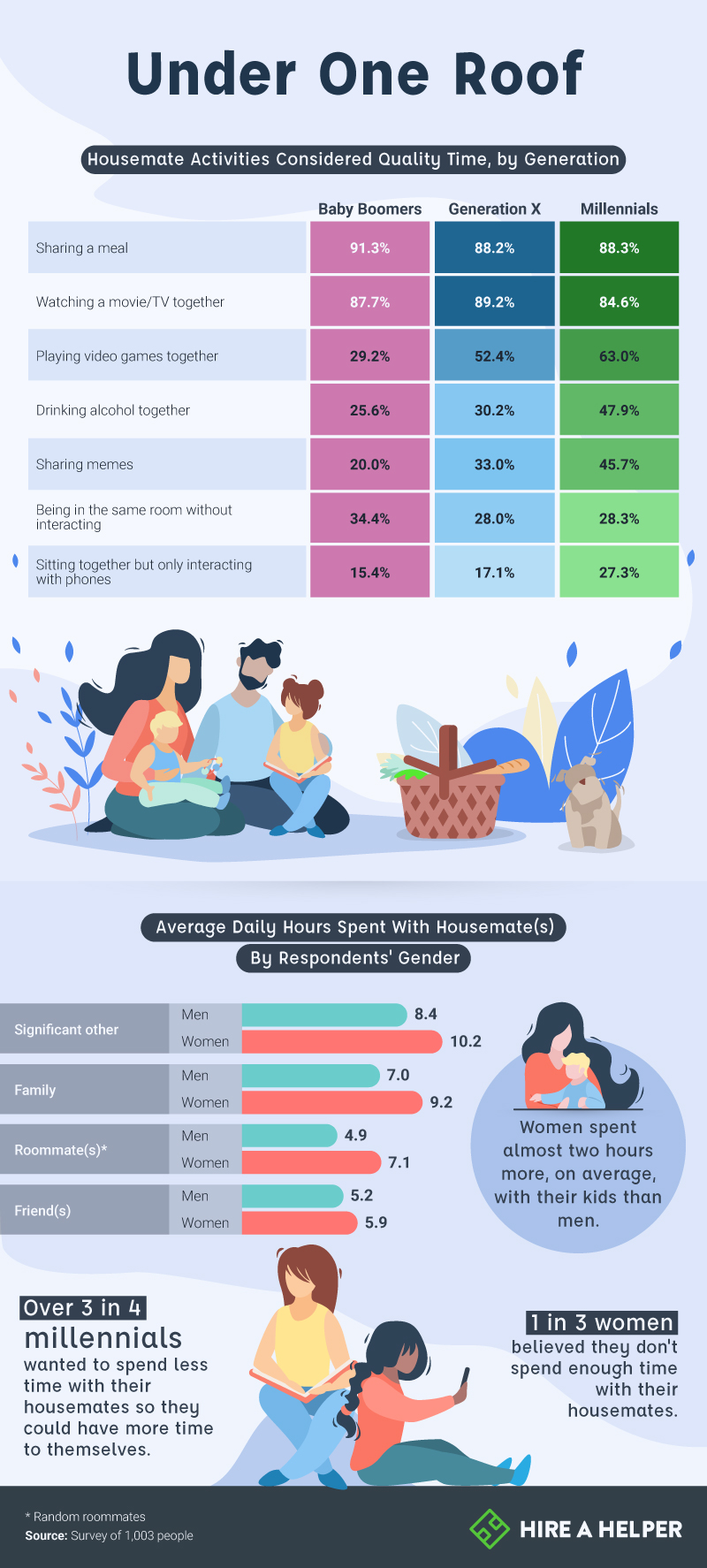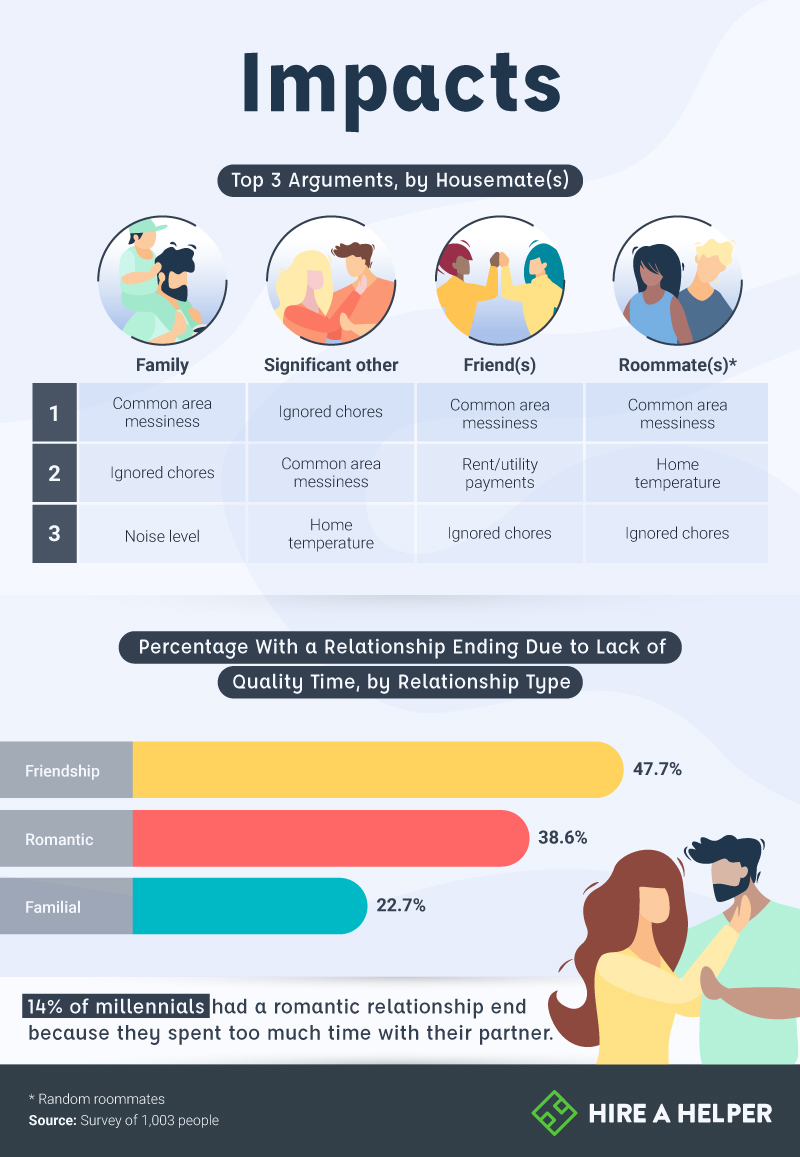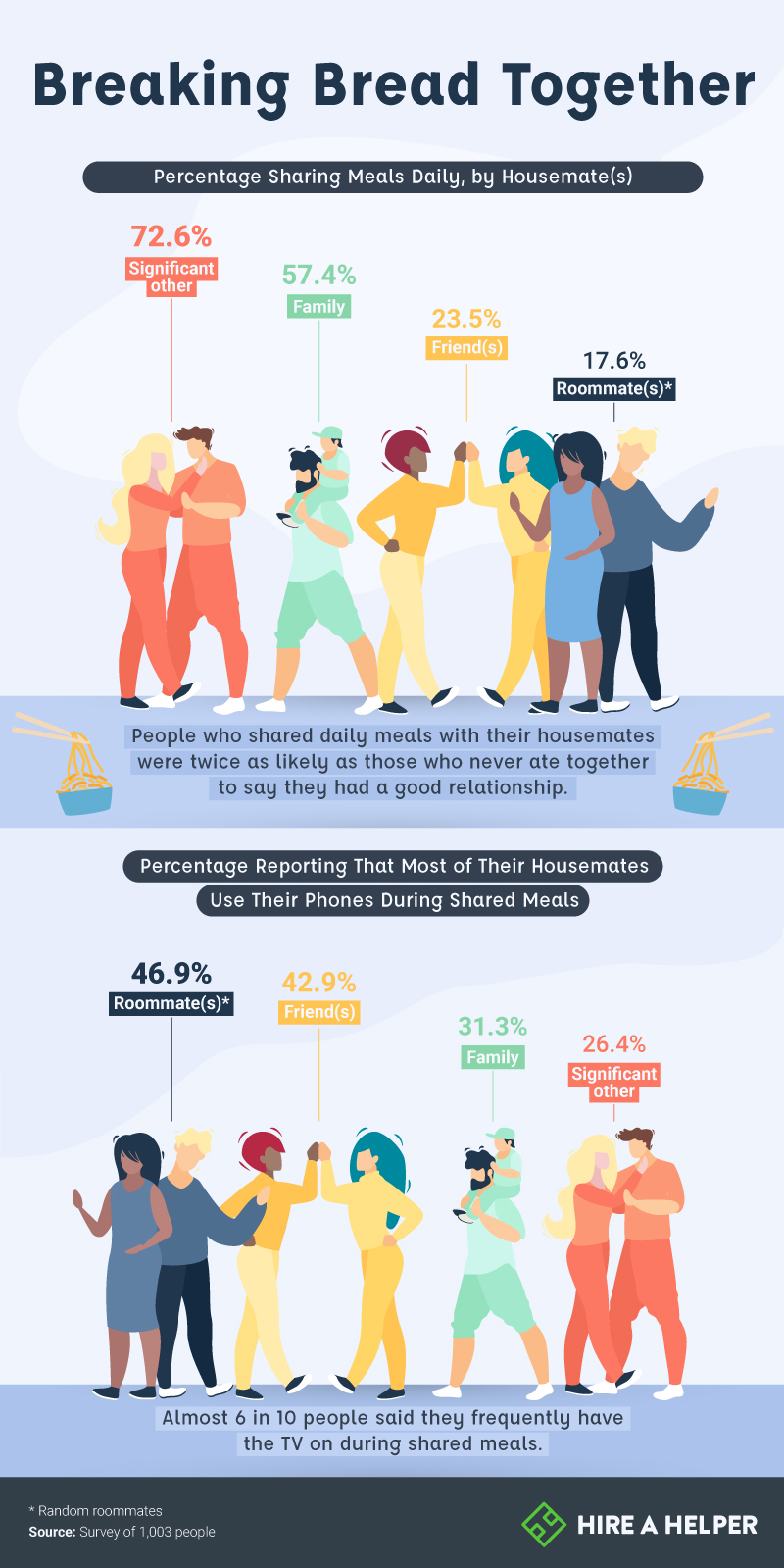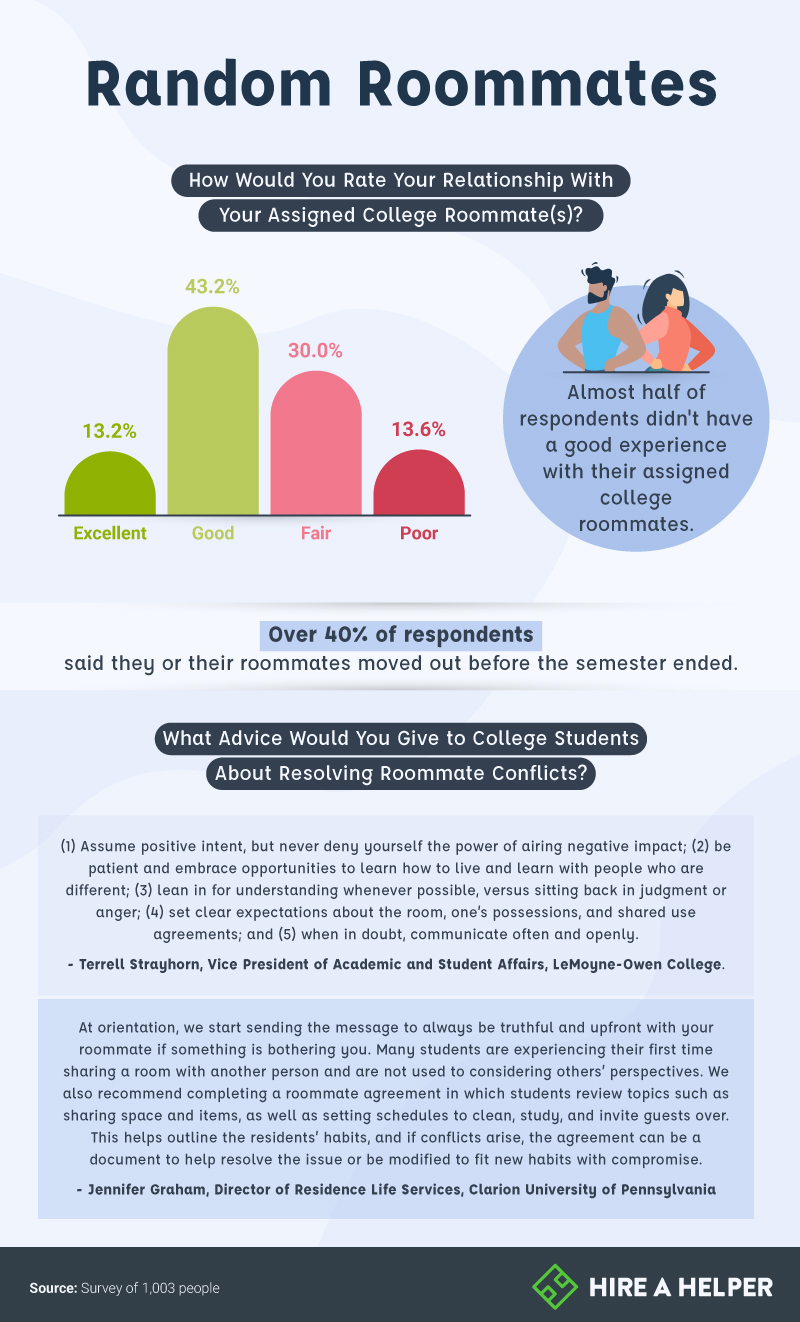

Quality Time
Exploring How We Spend Time With Our Housemates
October 25, 2019
From the moment you wake up to the second you lie down to go to sleep, it's easy to feel too busy. We tend to multitask with our leisure time (and even work on vacation), while chores continue to pile up at home. In fact, life can feel pretty hectic sometimes.
And while your health can certainly suffer from being too busy, there's another life aspect that can deteriorate as well: personal relationships. With only so many hours in the day to get things done, it can be easy putting off spending time with the people you live with –whether friends or family.
For a closer look at how not committing time to those we live with can impact our relationships, we surveyed over 1,000 people about how they spent time with their housemates. Take a closer look as we unpack "quality time," including how often relationships fall apart as a result of time constraints and how often we share meals with others under the same roof.
Sharing the Moment

When it comes to self-care, research shows establishing quality relationships with housemates are one of the best things you can do. Experts say the better your connection with the people you live with, the more they can check on your emotions and help brighten your day.
To understand which activities help people feel more connected to their housemates, we asked them to define "quality time" with another person. According to 91% of baby boomers and 88% of millennials, the penultimate bonding moment happened while sharing a meal. While 88% of Gen Xers also agreed that breaking bread counted as quality time, around 89% ranked watching a movie or TV together as the best way to spend time with another person. Millennials were also significantly more likely to identify playing video games together (63%), drinking alcohol (48%), and sharing memes (46%) as ideal opportunities to build deeper connections.
Across the more than 1,000 people surveyed, we found that women spent more time with their significant other, family, roommates, and friends compared to men. In addition to spending over 10 hours every day with their significant other (compared to eight hours for men), women spent nearly two additional hours with their children every day.
Household Issues

People who live together may tend to revisit the same arguments. For example, couples may repeatedly fight about the same things because of how they were raised or even in an effort at self-preservation.
The most common arguments between people living together – including family, significant others, friends, and roommates – revolved around messy rooms and household chores. For family, friends, and roommates, don't be surprised if you find yourself arguing over the mess found in common areas. However, chores being ignored were the biggest cause of discontent for significant others.
Depending on how often you argue, though, you may start to see some relationships drift apart. Nearly 48% of people acknowledged having a friendship end because they didn't spend enough time together, followed by romantic (39%) and familial (23%) relationships. Of course, it is always possible to get too much of a good thing. More than 1 in 10 millennials said they had a romantic relationship end because they spent too much time with their significant other.
Committing the Time

No matter how busy your daily schedule is, eating together can be a crucial part of your household dynamic. Evidence suggests that children who eat dinner regularly with their parents may even see improvements in their physical and mental health.
Among the more than 1,000 people surveyed, group meals were most common among significant others (73%), followed by family (57%), friends (over 23%), and roommates (nearly 18%). And while eating with nonrelated housemates may not be as common, people who said they ate together on a daily basis were twice as likely to say they had a good relationship compared to those who never ate together.
Feel like you can't enjoy a meal without looking at your phone? You certainly aren't alone. One study found that a third of Americans can't go through an entire meal without picking up their phones at least once, even though it distracts from the food and their ability to enjoy it. And around 31% of our respondents indicated that most of their family was on their phones during group meals, followed by 26% of significant others.
Picking Your Battles

In some situations, no number of group meals can improve a bad roommate relationship. Among the most common signs that your living situation may not go according to the plan include feeling happier when your roommates aren't around, speaking only when necessary, constant arguing, and a flagrant disrespect. In some cases, these conflicting relationships can occur in college dorms where some students have little or no control over who they live with.
Compared to only 13% of people who had an excellent relationship with their assigned college roommates, 30% rated the relationship as fair, and nearly 14% rated it as poor.
Keep Your Relationships Strong
No matter how busy your days are, relationships (even those with family and significant others) can fall apart when you don't commit the right energy to keep them going. The best quality bonding experiences proved to be sharing meals, watching TV or movies together, playing video games together, or even sharing a drink. Unfortunately, some of the biggest arguments among those who lived together focused on chores left undone and messy common areas.
Whether you're looking for a new roommate or transitioning into your dorm for the next semester, HireAHelper is here to help connect you to local movers. With packing, loading, transportation, and unloading services at your disposal, HireAHelper makes moving a stress-free experience for everyone involved. By helping you compare prices and sharing thousands of real customer reviews, you'll get simple, upfront pricing from providers you can trust. Ready to get packing? Visit us at HireAHelper.com to get started!
Methodology and Limitations
The data presented in the above study were gathered through a combination of a survey run with Amazon's Mechanical Turk service. The survey had a total of 1,003 respondents. 438 of these respondents were men, 562 were women, and three chose to identify as neither. There were a total of 196 baby boomers (with a margin of error of 7%), 402 from Generation X (margin of error of 5%), and 405 millennials (margin of error of 5%). The expert quotes given to us were gathered through interviewing individuals who worked in a college or university setting where they dealt with student housing interactions.
To qualify for this survey, respondents had to be living with at least one other person currently. All data presented rely on self-reporting, which can be host to issues like telescoping and exaggeration. To combat these issues and only include respondents who took the survey seriously, an attention check was added.
Fair Use Statement
Want to spend a little extra quality time with our research? You don't have to invite us to dinner to share the results of this survey for any noncommercial use, but we kindly ask that you include a link back to this page as a credit to our team of contributors.
Sources
- https://www.cbsnews.com/news/most-americans-check-work-email-while-on-vacation-linkedin-survey/
- https://www.cleverism.com/stay-mentally-healthy-and-battle-stress/
- https://www.telegraph.co.uk/lifestyle/family-time/why-we-need-more-family-time/
- https://www.refinery29.com/en-us/roommates-mental-health-effects
- https://www.psychologytoday.com/us/blog/evolution-the-self/201704/3-reasons-why-couples-have-the-same-fights-over-and-over
- https://www.sciencedaily.com/releases/2017/12/171214092322.htm
- https://nypost.com/2018/01/23/one-in-three-americans-cant-eat-without-their-phone/
- https://www.thoughtco.com/signs-of-a-bad-roommate-relationship-793696